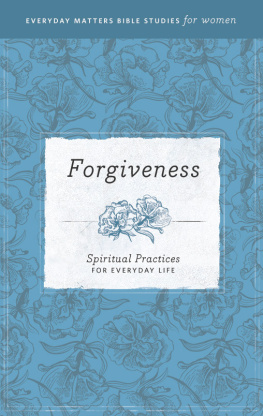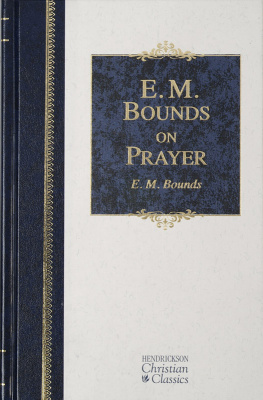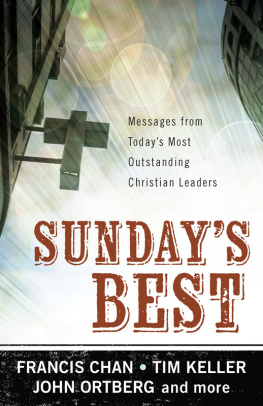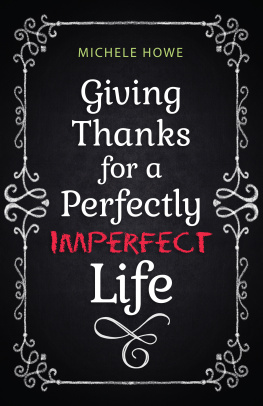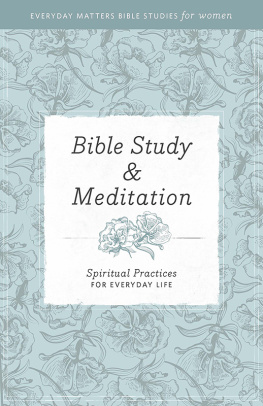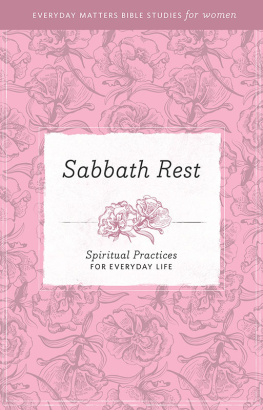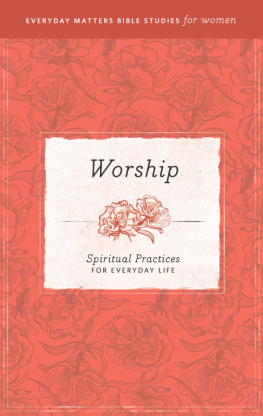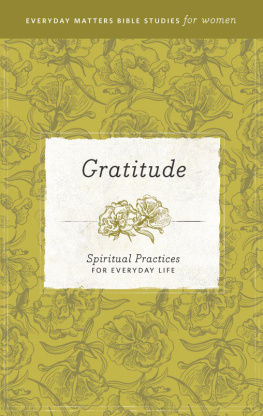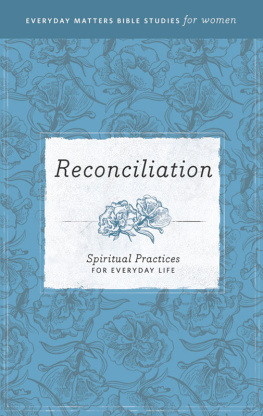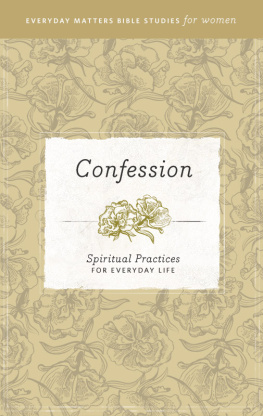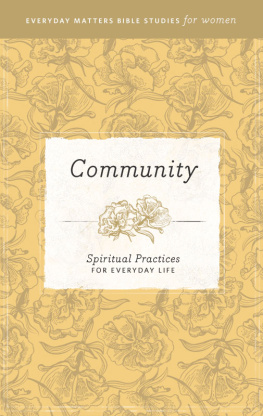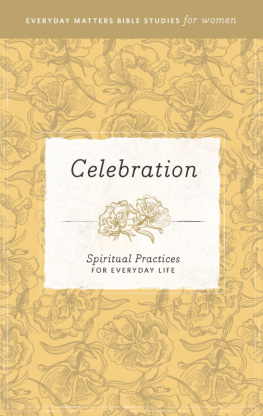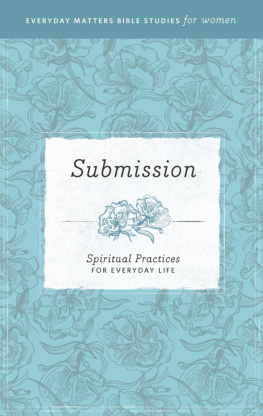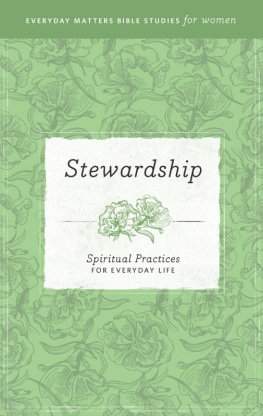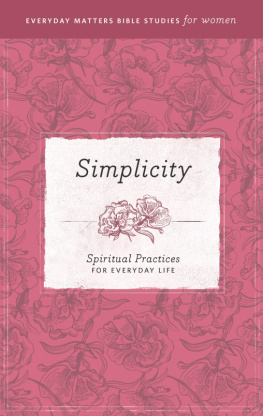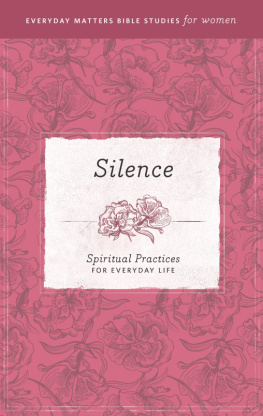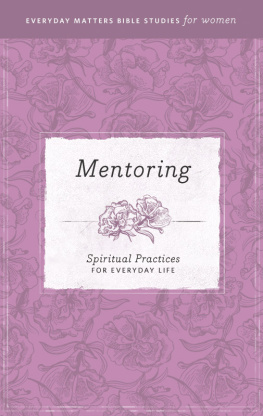All rights reserved. No part of this book may be reproduced or transmitted in any form or by any means, electronic or mechanical, including photocopying, recording, or by any information storage and retrieval system, without permission in writing from the publisher.
Unless otherwise indicated, all Scripture quotations are taken from the Holy Bible, New Living Translation, copyright 1996, 2004, 2007 by Tyndale House Foundation. Used by permission of Tyndale House Publishers, Inc., Carol Stream, Illinois 60188. All rights reserved.
Due to technical issues, this eBook may not contain all of the images or diagrams in the original print edition of the work. In addition, adapting the print edition to the eBook format may require some other layout and feature changes to be made.
Holy Habits
Spiritual Practices for
Everyday Life
Everyday life today is busier and more distracting than it has ever been before. While cell phones and texting make it easier to keep track of children and each other, they also make it harder to get away from the demands that overwhelm us. Time, it seems, is a shrinking commodity. But God, the Creator of time, has given us the keys to leading a life that may be challenging but not overwhelming. In fact, he offers us tools to do what seems impossible and come away refreshed and renewed. These tools are called spiritual practices, or spiritual disciplines.
Spiritual practices are holy habits. They are rooted in Gods word, and they go back to creation itself. God has hardwired us to thrive when we obey him, even when it seems like his instructions defy our common sense. When we engage in the holy habits that God has ordained, time takes on a new dimension. What seems impossible is actually easy; its easy because we are tapping into Gods resources.
The holy habits that we call spiritual practices are all geared to position us in a place where we can allow the Holy Spirit to work in us and through us, to grant us power and strength to do the things we cant do on our own. They take us to a place where we can become intimate with God.
While holy habits and everyday life may sound like opposites, they really arent.
As you learn to incorporate spiritual practices into your life, youll find that everyday life is easier. At the same time, you will draw closer to God and come to a place where you can luxuriate in his rich blessings. Here is a simple example. Elizabeth Collings hated running household errands. Picking up dry cleaning, doing the grocery shopping, and chauffeuring her kids felt like a never-ending litany of menial chores. One day she had a simple realization that changed her life. That day she began to use her chore time as a time of prayer and fellowship with God.
Whenever Elizabeth walked the aisle of the supermarket, she prayed for each person who would eat the item of food she selected. On her way to pick up her children, she would lay their lives out before God, asking him to be there for them even when she couldnt. Each errand became an opportunity for fellowship with God. The chore that had been so tedious became a precious part of her routine that she cherished.
The purpose of these study guides is to help you use spiritual practices to make your own life richer, fuller, and deeper. The series includes twenty-four spiritual practices that are the building blocks of Christian spiritual formation. Each practice is a holy habit that has been modeled for us in the Bible. The practices are acceptance, Bible study and meditation, celebration, community, confession, contemplation, faith, fasting, forgiveness, gratitude, hospitality, justice, mentoring, outreach, prayer, reconciliation, Sabbath and rest, service, silence, simplicity, solitude, stewardship, submission, and worship.
As you move through the practices that you select, remember Christs promise in Matthew 11:2830:
Come to me, all of you who are weary and carry heavy burdens. Take my yoke upon you. Let me teach you, because I am humble and gentle at heart, and you will find rest for your souls. For my yoke is easy to bear, and the burden I give you is light.
Introduction
to the Practice of Forgiveness
What is the hardest thing that God asks of us? Many would argue that it is forgiving those who have unjustly caused us pain or treated us with malice. How do you forgive a friend who has gossiped about you behind your back? A colleague or a boss who has unfairly cost you a raise or a promotion? How does one forgive a spouse who has been unfaithful? Sometimes it just seems like adding insult to injury that you should suffer at the hands of another and then be told to forgive them! And sometimes it feels impossible.
In her article in the Everyday Matters Bible for Women, Forgiving When It Seems Impossible, Dianne Collard recounts the murder of her 23-year-old son Tim. She and her husband were missionaries overseas and were called back to the states because Tim, while doing a friend a favor, had been shot point-blank in the head by an angry stranger. How does a heartbroken mother forgive her sons killer?
Yet the New Testament brims over with story after story of Jesus telling his followers to forgivenot seven times but seventy times seven (Matthew 18:2122). He doesnt say to forgive those who regret their offense and offer an apology. He doesnt say to forgive some offenses but not others.
The four studies on forgiveness that follow examine some of the challenges we face as we try to obey Christ and forgive those who have hurt us. Because this is such a difficult topic, it merits some preparation before you sit down to begin each study. Here are some things you can do to prepare your heart and your mind in order to get the most out of the material presented:
- Make a list of the people who come to mind whom you havent forgiven for their offenses.
- Confess to God that you are angry with each one by name. You can be honest with God about your feelings. You probably dont even want to forgive some of the people on your list. God already knows that. Confess your anger anyway.
- Ask him to use your time of study to speak to your heart in a way that will help you move toward forgiveness.
- Return to your list each time you sit down to study one of the lessons and write down anything that has occurred regarding your feelings toward each person.
- Remember that it takes time to forgive, and the greater the offense, the more time it usually takes. Be patient.
Reconciliation is part and parcel of forgiving and being forgiven. Is it possible to forgive without reconciliation? Yes, we can forgive someone with our mind, heart, and spirit and still not be reconciled with them. Reconciliation is a mutual action and experience. In order for us to reconcile with someone, that person has to want to reconcile with us. If God had forgiven the children of Israel but they didnt repent or want to be in relationship with him again, reconciliation could not take place. Thats true for us, too. Fortunately for us, God

